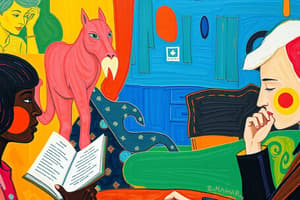Podcast
Questions and Answers
What is one misconception about literature?
What is one misconception about literature?
- Literature is only for entertainment (correct)
- All literature is radical
- Literature has no cultural significance
- Literature is essential for communication
Define literature according to the text.
Define literature according to the text.
It is one of the common denominators of human experience through which human beings may recognize themselves and converse with each other.
Literature is considered a female activity.
Literature is considered a female activity.
False (B)
What is a short story?
What is a short story?
What defines a novel?
What defines a novel?
What is drama?
What is drama?
What characterizes poetry?
What characterizes poetry?
What are proverbs and aphorisms?
What are proverbs and aphorisms?
What are Philippine folk songs?
What are Philippine folk songs?
Without literature, eroticism would still exist.
Without literature, eroticism would still exist.
What is a disadvantage of not reading literary texts?
What is a disadvantage of not reading literary texts?
Flashcards are hidden until you start studying
Study Notes
Understanding Literature
- Literature serves as a protector of liberty and is vital for human expression and understanding.
- It is often misconceived as a mere embellishment or entertainment for those with leisure time.
- Traditionally associated more with women, literature is an essential aspect of human experience, transcending cultural and geographical barriers.
Definitions and Importance of Literature
- Literature is a common thread in human experience that fosters recognition and dialogue among diverse individuals.
- It helps individuals transcend their historical contexts and appreciate the richness of human creativity through ethnic and cultural differences.
- Engaging with literature enriches human experience, making it more intense and meaningful compared to routine life.
Traditional Literary Genres
-
Short Story
- Narrative shorter than a novel; typically read in one sitting.
- Evokes strong emotions and focuses on key incidents, often with few characters.
-
Novel
- A long fictional narrative usually published as a book.
- Contains elements such as character representation, dialogue, setting, plot, climax, conflict, and resolution.
-
Drama
- A fictional representation presented through dialogue and performance.
- Plays are written for various mediums like theater, television, or film, often involving character conflicts.
-
Essay
- A literary work analyzing a single subject, reflecting the author's opinion.
- Shorter compositions that convey specific ideas or reflections.
-
Poetry
- Vivid expressions of ideas or emotions, characterized by rhythmic and metrical patterns.
- Utilizes literary techniques distinct from prose.
-
Proverbs and Aphorisms
- Short, impactful sayings conveying community beliefs and values.
- Serve as moral guides and communication tools.
-
Philippine Folk Songs
- Informal expressions reflecting cultural heritage and sentiments through music.
Consequences of Not Engaging with Literature
- Lack of reading literature can lead to severe communication issues, resulting in a primitive understanding of language.
- Absence of literature would deny the existence of nuanced concepts like eroticism.
- The critical mind, essential for historical progress and change, diminishes without literature.
Studying That Suits You
Use AI to generate personalized quizzes and flashcards to suit your learning preferences.




